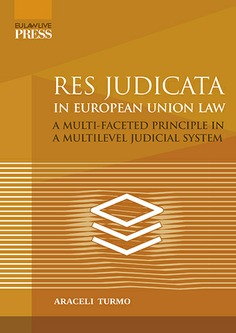Res Judicata in European Union Law
a multi-faceted principle in a multilevel judicial system
- ISBN: 9788413694740
- Editorial: Editorial Comares
- Fecha de la edición: 2023
- Lugar de la edición: Granada. España
- Colección: EU Law Live Press
- Encuadernación: Rústica
- Medidas: 24 cm
- Nº Pág.: 185
- Idiomas: Inglés

The concept of res judicata was introduced into European Community law very early on by the European Court of Justice and it remains an essential component both of EU procedural law and of the interactions between national procedural systems and EU law. It is a fascinating example of the inluence of comparative law on the ECJ and of this institution's normative powers. It is also at the heart of many conflicts with national courts, as EU law requires restrictions to national understandings of the scope of rules ensuring the finality of judicial decisions. Several recent judgments of the ECJ demonstrate that the issue remains important but also that litigants - and sometimes the Court itself - are not sufficiently aware of the rules established in the case law. A well-known and fundamental characteristic of any procedural system, this concept remains under-studied in EU law.
This book aims to provide practitioners and scholars with a detailed analysis of the nature, forms and functions of res judicata in the EU legal order, both as it applies within EU procedural law and with regard to EU law's impact on domestic rules. It includes a systematic presentation of the EU Courts' case law, explains the detailed procedural rules constructed by the Courts and suggests interpretations or clarifications where the rules are less well-established. It puts EU law into perspective through a comparative analysis, delving into the sources of the terminology and types of reasoning used by the Courts. The book also explains the distinction and relationship between res judicata and concepts such as the finality of judgments, ne bis in idem or precedent in EU law. It hopes to provide a reference point on the topic of res judicata in EU law, but also to be a starting point for further analysis and discussions on an important aspect of the EU judicial system.







